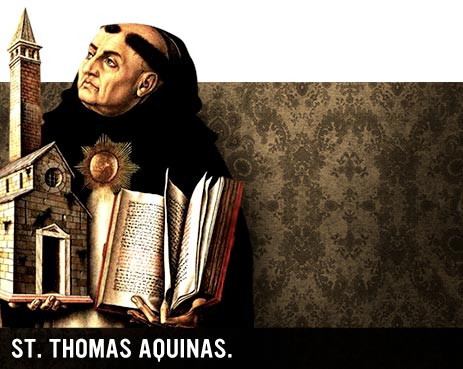Latest
-
Objections to the Christian Faith from the Unchurched and De-Churched
 Tue Dec 02, 2014
Tue Dec 02, 2014
by Resurgence -
Craig Groeschel: We Innovate for Jesus
 Tue Oct 14, 2014
Tue Oct 14, 2014
by Resurgence -
Mark Driscoll: Revelation
 Tue Oct 07, 2014
Tue Oct 07, 2014
by Resurgence -
RESURGENCE LEADERSHIP #034: JOHN PIPER, WHY I TRUST THE SCRIPTURES, PART 2
 Tue Sep 30, 2014
Tue Sep 30, 2014
by Resurgence -
Resurgence Leadership #033: John Piper, Why I Trust the Scriptures, Part 1
 Tue Sep 23, 2014
Tue Sep 23, 2014
by Resurgence

Archives
Vintage Saints: Thomas Aquinas
Thomas Aquinas was born in 1225 in his Italian family castle at Roccasecca. He grew up to be an unattractive heavy man who suffered from dropsy and had one eye that was much larger than the other. He was not a particularly dynamic man but rather an introspective, quiet loner who rarely entered a conversation, and when he did he would speak about something completely unrelated to the topic. Consequently, his college classmates named him “the dumb ox.” 
Kidnapped
In 1244 Aquinas joined the Dominican Catholic order. His family was greatly opposed to his decision because they wanted him to become wealthy and powerful, not take a vow of poverty. His brothers kidnapped him and held him captive for fifteen months in an effort to prevent him from entering a life of ministry. Unable to dissuade him, their last-ditch effort involved sending a woman into his bedroom to seduce him, but he forced her to leave his room and devoted himself to a life of chastity. Finally relenting, his family released Aquinas and in 1245 he went to Paris to study with Albert the Great. In 1250 he was ordained as a Catholic priest, and in 1256 he was named a master of theology at Paris.
Reasoning with the Greeks
At that time Christian theology was in great conflict with Greek philosophers, and Aquinas arose as the most competent thinker to address the interface between faith and reason. Many of the great thinkers of the day were enamored with Aristotle and his ability to explain all of reality not with faith and Scripture but with reason and philosophy. The growing popularity of Aristotle’s teaching was a great threat to Christianity on three major issues. One, Aristotle appeared to deny that a god made creation, preferring instead an eternal creation. Two, Aristotle was believed to oppose any concept of personal physical eternal life. Third, Aristotle seemingly taught that God only thought of Himself and was therefore not involved in the affairs of men or personally concerned about anyone.
Theology AND Reason
After carefully studying and writing commentary on a dozen of Aristotle’s works, Aquinas concluded that much of Aristotle’s work was misread by Islamic scholars and that most of his actual conclusions were compatible with Christianity. In agreement with Aristotle, Aquinas concluded that philosophical reason is based upon sensory data gathered by our five senses and that theological revelation does not contradict reason but exceeds it by providing insights to that which only God knows and the unaided human mind could never know otherwise. For example, Aquinas would agree that through reason and observing creation a person could reasonably conclude that there was a Creator, but apart from the revelation of Scripture one would never conclude that the Creator was the Trinitarian God.
The Reader
Throughout his life, Aquinas was an avid reader and author. Although he died before his fiftieth birthday, he produced more than ten million words in some sixty works, including eighteen enormous and dense volumes of theology. His penmanship was so poor and slow, though, that he dictated to as many as four secretaries simultaneously on different subjects. His surviving biblical commentaries include work on all of Paul’s letters and the gospels of Matthew and John, as well as a work called the Golden Chain, a collection of comments by various church fathers on all four of the gospels. His Old Testament works include a commentary on Job, a partial commentary on the Psalms (through the first fifty-one), and a commentary on Isaiah. For obvious reasons, Aquinas is widely regarded as the greatest theologian of the Middle Ages.
Summa Theologica
In 1265 Aquinas began writing perhaps his most famous work, the Summa Theologica, which means “a summation of theological knowledge.” While working on the massive tome, Aquinas had a vision that caused him to suddenly stop working on the project. Despite pleadings from his secretary, he never wrote again and spent the remaining months of his life in reported silence until his death in 1274. By Pastor Mark Driscoll Researched by Deacon Crystal Griffin